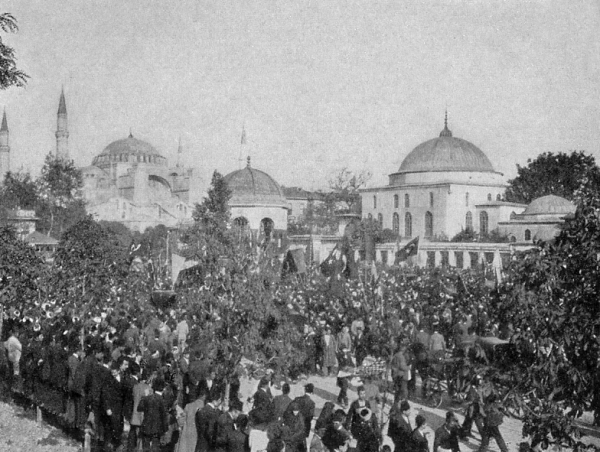Said Chaaya - The 1908 Young Turk Revolution in the Ottoman Empire
Shaker El-Khoury was born in Bkassine (Qada’a of Jezzine) in 1847. He went to multiple schools in the Shouf region including the National School founded by Boutros Al-Boustany, and had, thanks to his father’s influence, easy access to several premises that weren’t available for everyone at the time. Being the secret holder of Said Beik Jumblat, his father, Youssef El-Khoury, found no difficulty in obtaining a recommendation from Daoud Pasha, Mount Lebanon’s governor, to facilitate his son’s admission to Qasr Al-Ayni’s medical school, which was established in 1827 in Cairo by Mohammad Ali. The school attracted the upper crust Lebanese and Syrians, known then as the Shamists who lived in greater Syria. They had started their studies in Cairo, before moving to the AUB and the USJ medical schools in Beirut upon their establishment.
It might be worthwhile to pause at the words penned on the medical degree Shaker El-Khoury and his 20 colleagues received in 1874: “He graduated as a physician, thanks to God and the Khedive’s benevolence.”
The following are excerpts from the various writings he lavished on us throughout the years:
“The political freedom we have obtained is our liberation from espionage and censorship, for the former corrupts our souls and transforms us into scammers, swindlers and killers at the mercy of the lowest dregs of society that would trade and abandon us on a mere whim, while the latter leaves us so ignorant and lagging behind that we sense ourselves stooping lower than animals. It was censorship, which drove the owner of the printing house I work with, to mention that he has printed my book in Egypt, although he did it in Beirut. It was censorship, which taught him to lie. There is no more bitter oppression than espionage and no more degrading feebleness than censorship, which mistakenly believes that a simple book, or a simple word in a sentence or letter in a word could wreak havoc on the empire and transform the views of people. Name me one book that has thus far been able to wield such an influence.”
The Lebanese rejoiced the 1908 constitution, which called for freedom, fraternity and justice for everyone, without any discrimination as to the race or religion of people under the Ottoman Empire. However, it was evident that the reign of Sultan Abdul Hamid II, despite the urban prosperity it offered to the Levant, left a negative mark with respect to the press and censorship law due to the oppressive practices and constraints imposed on all publications including books, magazines and papers under the absolute power of the Sultan.
It is no surprise that Dr. Shaker El-Khoury, who lived during the Ottoman tanzimat known as the reform era, was among those who worked for reform in the wake of the 1908 Revolution and who were yearning for freedom and revolting against oppression and ignorance.
“To spread a new principle, one should predispose people to accept it. A previously experienced oppression changes humans easily and transitions them into an opposite principle. These are the reasons that change worldviews. The constitution, which is the political scripture of the Ottoman Empire, may not be preserved unless by the protection of the soldiery. Every soldier shall take an oath to protect the constitution upon his enlistment in the army, and so shall each official.”
If there were a revolution, it should be that against oppression in order to achieve justice. And such justice can only be translated properly through the preservation of the constitution, which according to Shaker Beik, should be defended like humans defend their sanctities.
“The Meclis-i Mebusan known as Second Parliament is not bound to bear similarity to the Tower of Babel, where numerous languages intermingle aimlessly and representatives try to model after old orators in their speeches, drifting off the subject of reform. It should instead enact to each province’s laws in line with its tradition, climate, knowledge and ignorance, so that our union be greater… for our empire has both greatly civilized provinces and greatly monstrous ones, and it is impossible for them to speak a single language.”
It is common knowledge that the Committee of Union and Progress has minimized the powers of Sultan Abdul Hamid II following the 1908 Revolution and forced him to put the 1876 constitution in force again. It has also revived the first Parliament, which the Sultan dissolved on February 14, 1878. The said constitution was an extension to the policy of arrangements necessitating the presence of an Ottoman Parliament representing all the nationalities and religions under the Ottoman Empire.
The hope that Shaker Beik El-Khoury had pinned on the second Parliament in 1908, over 100 years back, is tantamount to the hope of the Ottoman elites in reform, justice and freedom in the Levant at the time. And we may allow ourselves to add that the democracy represented by the rule of the people is the holy constitution, which the Lebanese have been seeking since before World War I. After over a century, the question remains: will Parliament continue to resemble the Tower of Babel with plenty of languages and orations but with little union and progress?








Leave A Comment